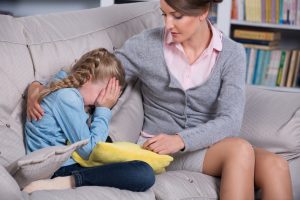Did you know that when we go through a traumatic event, like our current pandemic of COVID -19, it can cause some to have behaviors and show symptoms that mimic attention problems/ADHD, especially in our children?
Like the current unprecedented time that we are all living through, it can be obvious when we are going through a traumatic event. However, it is not always clear just how well or how poorly we are dealing with the stress of that event. At times our behaviors, emotions, processing, and reactions are healthy and possibly stellar. And then there may be other times that we just lose our sh%#!
The same rollercoaster can happen for our children when they experience a loss of routines, social interactions, afternoon activities, or just everyday life as they knew it.

Research has proven when our children experience a traumatic event, the psychological reaction that will occur is called childhood traumatic stress. This stress can affect children’s brains, emotions, and behavior in the same way these traumatic events can affect ours. Children can also have these stress responses to an event, whether it is happening directly to them or someone else, especially if it is to one of their family members.
Many of the signs, symptoms, and behaviors that are evident can be those that look like ADHD, processing issues, anxiety, and even emotional dysregulation (outbursts).
Take a deep breath.
You are not alone.
Unfortunately, stress-related trauma is one area where many professionals are not always skilled in determining if the symptoms you are seeing are rooted in trauma or are due to another neurological issue, like ADHD. This is why you need to know that there can be many similarities that can cross over different diagnosis when you look at your child’s behavior.

It is critical to find someone that is versed in assessing for trauma and other diagnoses to have the best possible assessment for understanding and treating their behaviors and emotions.
Stress-related to trauma and attentional/ADHD behaviors share several symptoms, including:
🟣 Trouble maintaining focus or concentrating
🟣 Difficulty retaining or learning information
🟣 Zoning out or easily distracted
🟣 Doesn’t listen well or follow through with directions
🟣 Disorganized thoughts, words or emotions
🟣 Hyperactive/restless behaviors
🟣 Not sleeping through the night
You may be wondering what qualifies as a traumatic event that can bring on the stress that your child may react to? It is not hard to say that the current pandemic of Covid-19 that we are all contending with clearly qualifies for a trauma that everyone is experiencing. Some in areas like the tri-state area in the US (NY/NJ/CT), states like California, and countries like Italy and China may experience higher levels than other places. Still, it comes down to how the individual perceives the situation regardless of the location. Many other types of events can have the same effects on our children that we also need to keep in mind.
Examples of other traumas include but are not limited to are:
-
- Severe injuries to self or others
- Life-threatening medical conditions to self or others
- Physical or sexual abuse
- Witnessing violent acts
- Neglect or abandonment
- Death of a loved one, including pets
- Natural disasters
- Car accidents
- Financial strains/stress in the family
- Divorce

As specialists trained in both trauma therapy and processing issues, we can help to assess and treat the behaviors that you are seeing for you and your child. We are here to help you overcome the stressors of this unprecedented time or any other event that you and your child may have experienced.
Sign up for your Free Consultation today!
Join our Facebook Group, and like/follow our Facebook Page or Instagram for more articles and tips!
Melissa Bianchini is a licensed clinical social worker in New York and the owner and executive director at Sensory Stepping Stones, LLC. Her career has spanned over 20 years working with children and families around neurological processing concerns, stress-related trauma, and anxiety. Her passion in life is to make a difference in the lives of kids and families that she works with. It has led her spirit to create a facility that facilitates a holistic approach to overall health, wellness, and processing development for those 3 through 93 years young! To unwind and reconnect, Melissa enjoys spending time at home with her husband, Damian, and her dogs and cats, exercising, eating chocolate (of course!), and doing anything that involves nature!

